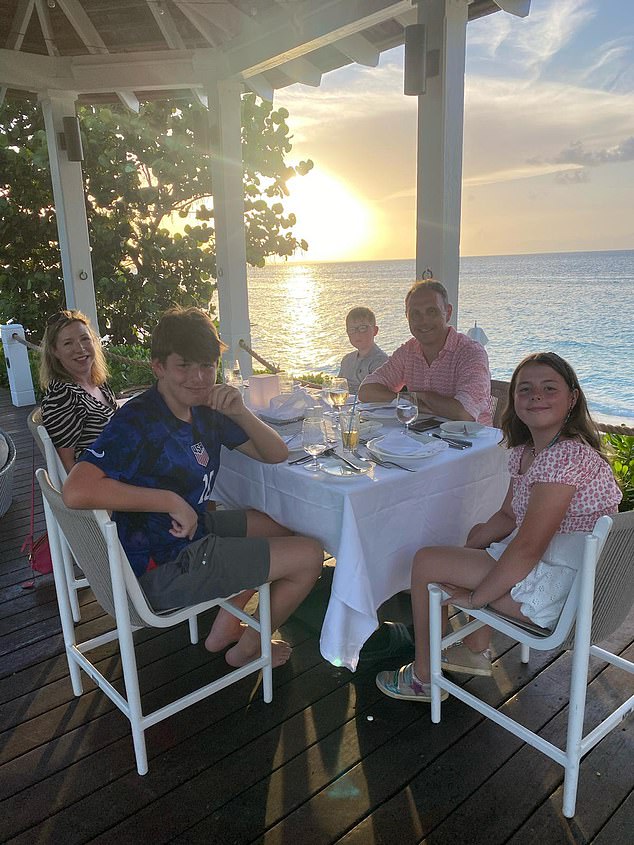[ad_1]
As I watch my 13-year-old son, Eddie, stroll beneath the palm trees by the pool with his autism ‘buddy’, I sit back in my sun lounger and try to relax.
Will he last the morning, I wonder?
We’re here in the beautiful Caribbean island of Turks and Caicos, staying at Beaches resort to experience its autism programme.
Beaches is the world’s only resort to have attained an Advanced Certified Autism Centre accreditation.
But what does that really mean? Kayanne Ajarie, the softly spoken Jamaican manager of the Kids’ Camp, provides the answers, explaining that all frontline staff have undergone specialised training on how to support autistic guests.
This includes sensory awareness, motor skills, communication and social skills.
Childcare staff, including the buddies who offer one-to-one care, have also taken an additional qualification from the International Board of Credentialing and Continuing Education Standards (IBCCES), a global autism training centre.
Buddies are trained to oversee all activities, and there’s an on-site culinary concierge who can create customised menus.

Georgina Fuller, pictured with her husband Dom and their three children visited Sandals, Turks and Caicos. They chose the resort on account of its dedicated autism centre, in the hope that the facilities offered might be of use to their son Eddie, who was diagnosed with the condition aged seven

Beaches is the world’s only resort to have attained an Advanced Certified Autism Centre accreditation

All frontline staff at the resort have undergone specialised training on how to support autistic guests
Kayanne tells me Beaches introduced the buddy programme after recognising increasing numbers of children at their kids camps had an autism or ADHD diagnosis and that there was a need for more specialised care.
Eddie, for example, hasn’t been able to go to a kids’ club since he was about four as he cannot cope with the noise.
He was diagnosed, aged seven, with autism, sensory processing disorder (SPD) and demand avoidance (a condition that makes him overwhelmed when confronted with demands).
He is also visually impaired, and joined a specialist school in 2023.
We have been on a learning curve since Eddie’s diagnosis, and along with our other two – Charlie, 16, and Jemima, 11 (who are not on the spectrum) – have tried to adapt our holidays.
Ahead of our trip, I complete a questionnaire to rate Eddie’s needs. I’m also asked what forms of communication he prefers – some staff are trained in sign language – what his triggers are and what he enjoys most: swimming, Lego and Minecraft.
We spend much of the week working around Eddie’s needs, which are, thankfully, quite simple.
But one of the things we struggle with, however, is the overwhelming choice – with 21 restaurants and more than five ‘villages’ (different themed accommodation), it’s quite daunting.

There are 21 restaurants and five ‘villages’ (themed accommodation) available at the resort, although the choice proves a little daunting for Georgina and her family

Beaches introduced the buddy programme after recognising increasing numbers of children at their kids camps had an autism or ADHD diagnosis and that there was a need for more specialised care
We have a room in the Italian Village, which is the busiest part of the resort and not ideal for Eddie, who’s not a fan of the steel-drum or the aqua aerobics classes.
We end up spending most of our time at the quieter Key West Village, which overlooks the beach and has smaller pools.
Eddie loves the breakfast buffets, and one of our highlights is an evening at a seafood restaurant, where we are given our own gazebo by the sea and Eddie discovers chicken nuggets on the menu.
Another night, we cautiously request a table at a Japanese restaurant.
We are offered noise-cancelling headphones on arrival, which Eddie turns down.
But the chef singing the Backstreet Boys proves too much, so Dom takes him outside until things have quietened down while the staff get Eddie some sushi.
We don’t manage to get Eddie to join in many other activities, sadly, and we are punished for not preparing him enough for our island tour of Middle and North Caicos.
The ferry is packed and Eddie hates the noise.

The Fuller family end up spending most of their time at the quieter Key West Village, which overlooks the beach and has smaller pools
We are all sad to leave and, although Eddie is a bit old for the buddies programme, I know it would have been a godsend when he was a bit younger.
After braving the 12-hour flight home, I ask Eddie what he most enjoyed about our trip.
He thinks for a moment before settling on the sushi.
OTHER AUTISM-FRIENDLY DESTINATIONS
DENMARK: Has a number of initiatives, including AUTISMGOTO, which provides autism-friendly guides to attractions, and the Hidden Disability Sunflower Programme to help those with conditions that may not be obvious.
NETHERLANDS: Efteling, a fairy-tale theme park, offers ‘facility cards’ to help guests with disabilities.
DUBAI: Recognised as the first certified autism destination in the Eastern hemisphere by the International Board of Credentialing and Continuing Education Standards. The Dubai Department of Economy and Tourism has also provided training for 70,000 tourism workers across 300 hotels and 15 attractions.
AMERICA: The US has a number of autism-friendly states, including Arizona, California and Florida. The Kennedy Space Center Visitor Complex in Florida has become a Certified Autism Center, with clearly marked low-sensory areas, while Legoland, Aquatica Orlando and SeaWorld in Florida are all designated autism-friendly attractions.
[ad_2]
This article was originally published by a www.dailymail.co.uk . Read the Original article here. .

